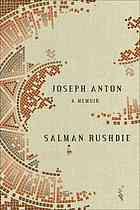
Joseph Anton
A Memoir
کتاب های مرتبط
- اطلاعات
- نقد و بررسی
- دیدگاه کاربران
نقد و بررسی

September 24, 2012
Hailed as a literary martyr and derided as a prima donna, Rushdie emerges as both inspiring and insufferable in this memoir of his life following the 1989 fatwa issued against him by Iran's Ayatollah Khomeini. The British-Indian novelist's third-person account of the firestorm surrounding The Satanic Verses is harrowing as he's hounded, under the pseudonym "Joseph Anton," and moved from one hiding place to another under constant police guard while Islamists everywhere call for his death, and the British government treats him as an undeserving troublemaker. (Bookstore bombings and murderous attacks on a publisher and translators, he notes, show how serious the threat was.) But once Rushdie regains his nerve, his fetters accommodate much jet-setting lionization as he travels the world, collects awards and ovations, and parties with glitterati at the Playboy Mansion. Rushdie mixes stirring defenses of free speech with piquant observations on the subculture of maniacal high-level security, ripostes to detractors and ex-wivesâ"when he mentioned a pre-nup, the conversation became a quarrel"âsex gossip and incessant name-dropping ("Willie Nelson was there! And Matthew Modine!"). There's preening self-dramatization by the celebrity authorâ but a persistent edge of real drama, and fear, makes Rushdie's story absorbing.

Starred review from October 15, 2012
The frightening, illuminating and disturbing memoir by the author of The Satanic Verses, the book that provoked a death sentence from the Ayatollah Khomeini in 1989. Rushdie (Luka and the Fire of Life, 2008, etc.) chose for his cover name (and for the title) the first names of Conrad and Chekhov--appropriate, for the author seemed caught in a tangled novel filled with ominous (and some cowardly) characters driven by an inscrutable fate toward a probable sanguinary climax. The author uses third person throughout, a decision that allows him a novelist's distance but denies some of the intimacy of the first person. Perhaps he viewed himself during those 13 years (the duration of his protection by British security forces) more as a character than a free agent. He returns continually to an image from Hitchcock's The Birds: the black birds gradually filling up a jungle gym on a school playground (these represent the threats to personal freedom presented by fundamentalists). Rushdie also includes unmailed letters to actual people (Tony Blair) and to ideas (the millennium). The organization is unremarkable: The author begins with his learning of the fatwa, retreats to tell about his life before 1989, then marches steadily toward the present with only a few returns (a section about his mother's love life). Bluntly, he tells about his wives, divorces, affairs, successes and failures of pen and heart and character; his various security guards; and, very affectingly, about his two sons. He tells about his travels, many awards and celebrity friends. Emerging as heroic is the United States, where Rushdie realized he could live more freely than anywhere else. Aspects of a spy novel, a writer's autobiography and a victim's affidavit pulsing with resentment and fear combine to reveal a man's dawning awareness of the primacy of freedom.
COPYRIGHT(2012) Kirkus Reviews, ALL RIGHTS RESERVED.

April 15, 2012
Placed under a fatwa by the Ayatollah Khomeini in February 1989, distinguished author Rushdie was forced underground to save his life. He needed an alias for use by the armed police assigned to protect him and so chose Joseph Anton, which blended the first names of two writers he loved, Conrad and Chekhov. Here he recounts over nine years of moving from safe house to safe house, mastering despair, fighting back, bonding with his protectors, and enlisting the support of governments, journalists, and fellow writers worldwide. His memoir matters not simply because of startling personal detail but because his experience presaged a global battle over freedom of speech that continues today. With a six-city tour; the extensive publicity includes an NPR campaign.
Copyright 2012 Library Journal, LLC Used with permission.

Starred review from October 15, 2012
Rushdie accomplishes many wondrous and momentous feats in this profound and galvanizing memoir. He shares the now strangely foreshadowing fact that his ardent storyteller father invented their last name, paying tribute to Ibn Rushd, a twelfth-century Spanish Arab philosopher who argued for rationalism over Islamic literalism. He explains how, decades later, when British protection officers asked him to come up with an alias, really a nom de guerre, Rushdie concocted Joseph Anton in homage to Joseph Conrad and Anton Chekhov. His first fictions, he observes, were the upbeat letters he sent to his parents in India, concealing his boarding-school miseries in cold and racist 1960s England. He learned to focus on his inner life, cherish kindred spirits, and navigate adversity, skills that served him well after the Ayatollah Khomeini issued his fatwa, sentencing Rushdie to death for writing The Satanic Verses (1988). Rushdie tells the full, astonishing, and necessary story of his 13 hellish years of threats, risk, and protective isolation in a passionately detailed, sardonically witty, and intensely dramatic third-person chronicle of a landmark battle in the war for liberty in the Muslim world. Forthright about his personal struggles and immensely grateful to all who championed his cause, Rushdie elucidates what literature does for us and why artistic and intellectual freedoms truly are matters of life and death.(Reprinted with permission of Booklist, copyright 2012, American Library Association.)

























دیدگاه کاربران